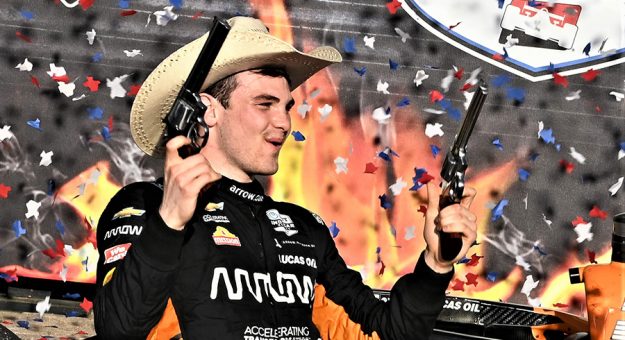INDIANAPOLIS — From Indy Lights teammates with Andretti Autosport to becoming winners in the NTT IndyCar Series, Colton Herta and Pato O’Ward appear destined to share the path to success.
It was at California’s Sonoma Raceway at the end of the 2018 IndyCar Series season when the drivers who finished first and second in the Indy Lights championship were introduced as teammates for the 2019 IndyCar Series.
The two teenagers would compete for Harding-Steinbrenner Racing and were already hailed as IndyCar’s faces of the future.
That season-ending race three years ago was the only time the two drivers were IndyCar teammates. Because of economic difficulties from team co-owner Mike Harding, as well as lack of sponsorship, the team had barely enough funding for one driver, much less for two.
O’Ward shocked the series on media day prior to the season when he announced he was leaving the team because Harding was not living up to his contract. That left Herta as the team’s lone driver.
It didn’t take long for the son of four-time IndyCar winner Bryan Herta to show his promise as he became the youngest winner in Indy car racing history at Circuit of The Americas. The 18-year-old driver was just a few days short of his 19th birthday when he won the race.
“Our plan entering the season was to corner the market in young talent,” team president Brian Barnhart told SPEED SPORT that day. “With Colton Herta and Pato O’Ward, we were set with the two best drivers to come into the series at the same time in years.
“We were set up for success, before the sponsorship issues hit.”
O’Ward was in the field that day, driving for Carlin Racing in what was supposed to be a limited schedule. But when he failed to make the field for the 2019 Indianapolis 500, O’Ward left the United States to join the Red Bull development program.
Meanwhile, Herta continued to impress by becoming the youngest pole winner in IndyCar history at Wisconsin’s Road America that June, before closing the season with a decisive victory at California’s WeatherTech Raceway at Laguna Seca for the second victory of his rookie season.
O’Ward’s big break was about to arrive, however.
McLaren had purchased a major stake in what was previously Arrow Schmidt Peterson Motorsports to become Arrow McLaren SP. O’Ward was selected to team with 2019 Indy Lights champion Oliver Askew.
It’s almost as if McLaren CEO Zak Brown was using the same blueprint that Harding Steinbrenner had set in motion at the end of 2018.
O’Ward flourished with the new team. He won the pole for the second race of a doubleheader at Road America and led 44 laps in the 55-lap contest before giving up the lead to eventual winner Felix Rosenqvist of Chip Ganassi Racing.
O’Ward ran third in the series championship for most of the season before dropping to fifth with one race to go. O’Ward finished second to Team Penske’s Josef Newgarden during the season finale in the streets of St. Petersburg, Fla., and finished fourth in the standings.
This year, O’Ward became the senior driver of the team, even though he was only 21 years old. Askew was replaced by Rosenqvist and O’Ward drove with all the savvy of a veteran, combined with the exuberance of a young driver who was unafraid to push the limit.
Fittingly, just one week after Herta won the Firestone Grand Prix of St. Petersburg, O’Ward joined him as an IndyCar Series race winner with an impressive victory in the XPEL 375 at Texas Motor Speedway.
As the driver from Monterrey, Mexico, was celebrating his first IndyCar victory by shooting off the famed “six-shooters” in victory lane at TMS, Herta was talking about his fifth-place finish in the race.
When asked how he felt to see his friend, former teammate and rival celebrate his first victory, the 21-year-old Herta smiled.
“It’s about time; he’s been so close so many times, he really deserves it,” Herta told SPEED SPORT. “I’m happy to see him win and it was a great job by him and his team today.”
These two drivers, along with the continued improvement by 20-year-old Dutch driver Rinus VeeKay, who won the GMR Indy Grand Prix on May 15, form IndyCar’s “Kiddie Korps.”
These are the drivers who will fight each other for victories, challenge for championships and potentially become the best drivers of their generation.
It may happen as soon as this season.
